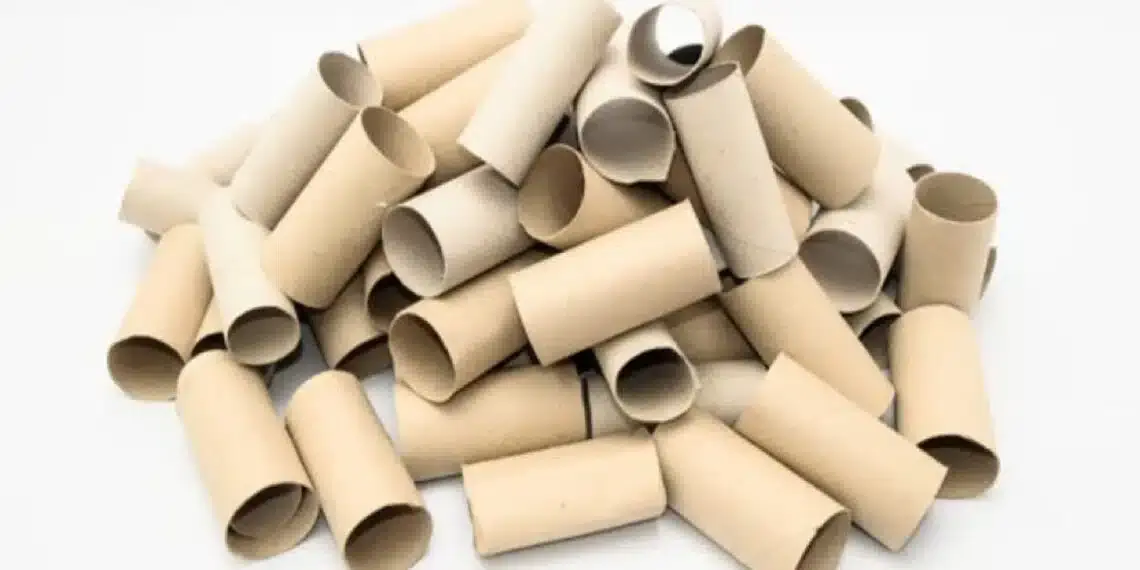2. Root Training Tubes for Deep-Rooted Plants
Some plants, like beans, peas, and sunflowers, thrive when their roots grow deep. Toilet rolls provide the perfect mini root-training system.
How to Do It:
- Stand the rolls upright in a container.
- Fill with soil and sow large seeds like peas, beans, or sweet peas.
- Once the seedlings are 3–4 inches tall, plant the whole roll in the ground.
Benefits:
- Encourages deeper root systems for stronger plants.
- Prevents delicate roots from being disturbed during transplanting.
- Ideal for crops that hate being transplanted (like sweet peas).
3. Compost Boosters
Toilet rolls aren’t just containers – they’re excellent compost material.
How to Use:
- Tear rolls into smaller pieces before adding them to your compost bin.
- Mix with nitrogen-rich “greens” like kitchen scraps for balance.
Why It Works:
Cardboard is high in carbon, helping to balance the green-to-brown ratio in compost piles. This ensures faster decomposition and prevents odors.
Pro Tip: Flatten or shred the rolls to speed up breakdown.
4. Mulch & Weed Barriers
Weeds are a constant battle in any garden, but toilet rolls can be used as a natural weed suppressant.
How to Do It:
- Split rolls lengthwise and flatten them.
- Lay them around the base of plants as mulch.
- Cover with soil, grass clippings, or wood chips.
Benefits:
- Blocks sunlight to prevent weeds.
- Retains soil moisture around plant roots.
- Decomposes over time, enriching the soil.
5. Bug & Pest Deterrents
Young seedlings are often victims of cutworms, slugs, and other pests. Toilet rolls can be used as protective collars.
How to Do It:
- Cut a roll in half.
- Place it around the base of young seedlings, pushing it slightly into the soil.
Benefits:
- Protects tender stems from cutworms.
- Acts as a barrier against crawling pests.
- Biodegradable, so you don’t need to remove them later.
6. Bird & Beneficial Insect Feeders
Cardboard tubes can be transformed into simple feeders to attract pollinators and pest-eating birds.
How to Make a Bird Feeder:
- Spread peanut butter on the outside of a toilet roll.
- Roll it in birdseed.
- Slide the roll over a branch or stick.
How to Make a Bug Hotel:
- Stuff rolls with straw, twigs, or pine needles.
- Bundle several together and secure with string.
- Place in a sheltered area to attract beneficial insects like ladybugs or solitary bees.
Benefits:
- Encourages biodiversity in your garden.
- Provides natural pest control.
- Supports pollination for better harvests.
7. Storage for Garden Twine & Small Tools
Finally, toilet rolls can help with organization in the garden shed.
How to Do It:
- Use them to store garden twine or string neatly.
- Bundle small items like plant labels, stakes, or drip irrigation tubes.
Benefits:
- Keeps your shed tidy.
- Saves time hunting for supplies.
- Extends the life of your gardening materials.
Bonus Ideas: Extra Creative Uses
If you have more rolls piling up, here are a few extra garden hacks:
- Label Holders: Flatten and cut into strips for biodegradable plant labels.
- Pot Drainage: Place in the bottom of pots for better airflow and drainage.
- Fire Starters for Garden Bonfires: Stuff with dryer lint and use to light outdoor fires.
Tips for Using Toilet Rolls Safely in the Garden
While they’re generally safe, here are a few things to keep in mind:
- Avoid Printed Rolls: Use plain brown cardboard only.
- Don’t Overwater: Rolls can become soggy; place them in trays.
- Bury Deeply if Outdoors: Prevents them from drying out too quickly.
Environmental Impact: Small Steps, Big Difference
Every roll reused is one less item in the landfill. Considering the average household goes through 100+ rolls per year, reusing them in the garden helps reduce waste while improving sustainability.
By incorporating these little hacks, you’re not only saving money but also building a greener, more self-sufficient garden.
The next time you finish a roll of toilet paper, don’t see it as trash. See it as a mini seed pot, a compost booster, a bug protector, or a mulch strip.
These simple cardboard tubes can do more than you ever imagined – saving money, improving soil health, and helping your plants thrive naturally.
